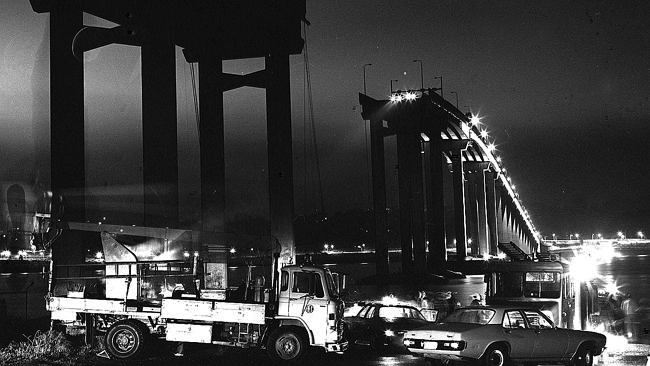Are we waiting for a non-negotiable climate change signal? [20 January 2015 | Peter Boyer]
With one-seventh of the 21st century already gone (can you believe it?), it’s time to take stock. A warning: readers may find the following depressing.

A non-negotiable event: the Tasman Bridge on the night it was broken, 5 January 1975. PHOTO Don Stephens, Mercury
It’s now 120 years since Svante Arrhenius calculated that burning coal could cause the planet to heat up, and nearly 80 years since Guy Callendar produced evidence that this was actually happening. Virtually no-one believed them.
It’s over half a century since science was hit with much stronger evidence that humans affect the climate, including data showing unmistakeably rising carbon dioxide levels in the air and calculations that warming may get out of hand.
In 1988 NASA physicist James Hansen alerted the US Congress to a potential climate crisis and the Intergovernmental Panel on Climate Change was set up. Since then countless international meetings have happened and a handful of major political agreements have been secured.
Much of this has been window-dressing. Agreements and targets have been sidestepped, ignored or repudiated. In the past few years political and corporate leaders, “forgetting” earlier pledges of unwavering support for climate action, have returned to their business-as-usual comfort zone.
That also spelt the end of a brief period of enhanced public support for climate science. Contrary to claims that climate scientists are a powerful lobby group living high on public money, securing funding support has in recent years been a losing battle.
Despite steadily-mounting evidence that human-induced climate change is upon us, with grave implications for the future of humanity, leaders continue to behave as if it’s of no consequence. How has all this happened?
The big problem is that our economic future has become so enmeshed with the burning of fossil fuel that no-one, neither governments nor the population at large, can accommodate the thought of living without it. So we sideline the subject using a variety of devices.
One such device is to label the issue of climate change as “green” (code for “irrelevant”). This was the thinking behind the Abbott government’s prompt action on winning office to abolish the climate change department and transfer its responsibilities to the environment department.
Under this scenario scientists are “greenies”, or alternatively green parties have hijacked their work and twisted their findings to make things seem worse than they really are. Both notions are manifestly false, but the implication is that climate change isn’t a serious policy issue.
Many who say they accept man-made climate change behave as if they believe no such thing. They continue to treat it as second-order policy, as opposed to “higher level” matters like economic development, trade, defence or the state of government coffers.
This isn’t confined to conservative politicians. In response to Tony Abbott’s relentless attacks on its carbon price scheme, the Labor government failed to defend the significant structural reforms built into it and in the end lamely followed Abbott’s lead by promising to “axe the tax”.
Then there’s the “techno-fix” argument, that the inexorable advance of technology will see us through. It comes in many forms.
Adopting renewable power, smart electricity metering and electric transport makes sense. But we have no replacement for the fossil power deployed in aviation, shipping and some heavy industrial applications like steelmaking. Only tough economic and behavioural change will address that.
More pernicious, and much crazier, are ideas like shooting particles into the air to deflect sunlight and cool the surface, designed to allow us to burn all the fossil fuel we like. There’s no way of testing the potentially catastrophic impact of any of these planetary-scale “solutions”.
All these are ways of setting aside the unattractive reality that fixing the world’s climate woes requires heavy lifting, not just from all governments, including state and local governments, but also from all business (especially big business) and all the rest of us.
Each passing year makes it more difficult to implement effective climate policies and plans, yet we remain in our comfort zones, waiting for a sign from heaven that we hope will never come.
We’ve had some hints from up there – damaging heatwaves, droughts, bushfires and floods which have been causally linked to carbon emissions. But the connection remains elusive for many Australians, and governments don’t seem to like people talking about it.
The collapse of three spans of the Tasman Bridge 40 years ago was a killer punch to the people of Hobart. No-one questioned that they had to abandon the car and take to the ferry, because the answer was staring them in the face. Are we waiting for another non-negotiable event like that?
• A Japanese global temperature analysis released a fortnight ago and three more from the US last week all said 2014 was the warmest year on record. I’ll comment on this after release of British and World Meteorological Organization analyses around the end of January.
